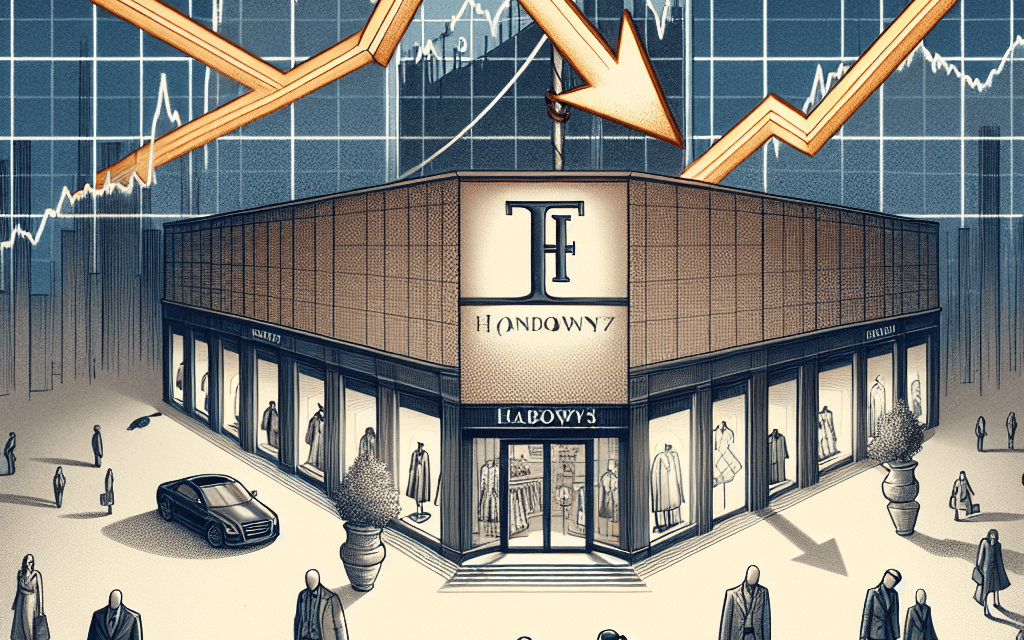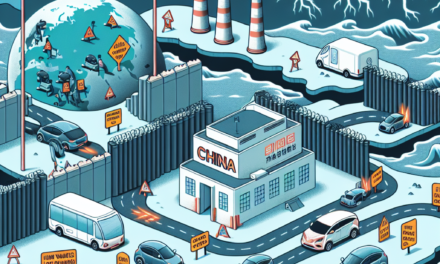“Hugo Boss Faces Profit Squeeze as Luxury Demand Falters”
Introduction
Hugo Boss, the renowned German fashion and lifestyle brand, has reported a decline in profits, reflecting ongoing challenges in the luxury market. The company, known for its high-end apparel and accessories, is grappling with a persistent softness in consumer demand for luxury goods. This downturn is attributed to various factors, including global economic uncertainties, shifting consumer preferences, and increased competition within the luxury sector. As Hugo Boss navigates these turbulent times, the brand is focusing on strategic initiatives to revitalize growth and adapt to the evolving market landscape.
Impact of Global Economic Trends on Hugo Boss’s Profit Decline
Hugo Boss, a renowned name in the fashion industry, has recently reported a decline in profits, a development that underscores the broader challenges facing luxury brands in the current economic climate. This downturn is not an isolated incident but rather a reflection of the intricate interplay between global economic trends and consumer behavior. As the world grapples with economic uncertainties, the luxury sector, traditionally seen as resilient, is experiencing a shift that is impacting even the most established brands.
To understand the profit decline at Hugo Boss, it is essential to consider the broader economic context. The global economy has been marked by volatility, with factors such as inflation, fluctuating currency values, and geopolitical tensions contributing to an environment of uncertainty. These elements have collectively influenced consumer spending patterns, particularly in the luxury segment. As inflation rates rise, consumers are becoming more cautious with their discretionary spending, opting to prioritize essential goods over luxury items. This shift in consumer behavior has had a direct impact on luxury brands, including Hugo Boss, which rely heavily on consumer confidence and spending power.
Moreover, the luxury market is also facing challenges from changing consumer preferences. The modern consumer is increasingly driven by values such as sustainability and ethical production, prompting a shift away from traditional luxury goods towards brands that align with these values. Hugo Boss, while a leader in fashion, must navigate this evolving landscape by adapting its strategies to meet the demands of a more conscientious consumer base. This requires not only innovation in product offerings but also a commitment to transparency and sustainability in its operations.
In addition to these consumer-driven factors, the luxury sector is also contending with supply chain disruptions, a lingering effect of the COVID-19 pandemic. These disruptions have led to increased production costs and delays, further squeezing profit margins for companies like Hugo Boss. The brand must therefore balance the need to maintain its high-quality standards with the economic realities of increased operational costs. This balancing act is crucial in ensuring that Hugo Boss remains competitive in a challenging market.
Furthermore, the geopolitical landscape has also played a role in shaping the fortunes of luxury brands. Trade tensions and regulatory changes in key markets have created additional hurdles for companies operating on a global scale. For Hugo Boss, which has a significant international presence, navigating these complexities is vital to sustaining its market position. The brand must remain agile, adapting its strategies to mitigate the impact of these external pressures.
Despite these challenges, there are opportunities for Hugo Boss to leverage its strong brand identity and heritage to regain its footing. By embracing digital transformation and enhancing its online presence, the company can tap into new markets and reach a broader audience. Additionally, investing in innovative marketing strategies and collaborations can help Hugo Boss connect with younger consumers who are increasingly influential in the luxury market.
In conclusion, the profit decline experienced by Hugo Boss is a reflection of the broader economic trends impacting the luxury sector. While the challenges are significant, they also present an opportunity for the brand to evolve and adapt to the changing landscape. By addressing consumer preferences, optimizing supply chain operations, and navigating geopolitical complexities, Hugo Boss can position itself for future growth and success in the ever-evolving luxury market.
Strategies for Hugo Boss to Navigate Weak Luxury Demand
Hugo Boss, a renowned name in the luxury fashion industry, has recently faced a decline in profits, largely attributed to the persistent weakness in global luxury demand. This downturn presents a significant challenge for the brand, which has long been synonymous with high-end fashion and sophisticated style. However, by adopting strategic measures, Hugo Boss can navigate these turbulent times and potentially emerge stronger.
To begin with, diversifying product offerings could be a pivotal strategy for Hugo Boss. By expanding beyond traditional luxury items, the brand can tap into new market segments and attract a broader customer base. This could involve introducing more affordable lines or venturing into casual wear, which has seen increased demand as consumer preferences shift towards comfort and practicality. By doing so, Hugo Boss can maintain its brand prestige while appealing to a wider audience, thereby offsetting the decline in luxury demand.
Moreover, enhancing digital presence is crucial in today’s technology-driven world. As consumers increasingly turn to online platforms for shopping, Hugo Boss must strengthen its e-commerce capabilities. This involves not only optimizing its website for a seamless shopping experience but also leveraging social media and digital marketing to engage with customers. By creating compelling online content and utilizing data analytics to understand consumer behavior, Hugo Boss can tailor its marketing strategies to better meet the needs of its audience, thus driving sales and brand loyalty.
In addition to digital expansion, focusing on sustainability could serve as a key differentiator for Hugo Boss. As environmental concerns continue to influence consumer purchasing decisions, brands that prioritize sustainability are more likely to resonate with modern consumers. Hugo Boss can capitalize on this trend by adopting sustainable practices across its supply chain, from sourcing eco-friendly materials to ensuring ethical labor practices. By transparently communicating these efforts, the brand can enhance its reputation and appeal to environmentally conscious consumers, potentially mitigating the impact of weakened luxury demand.
Furthermore, strengthening customer relationships is essential for Hugo Boss to retain its existing clientele and attract new customers. This can be achieved through personalized customer service and loyalty programs that reward repeat purchases. By offering exclusive experiences or tailored recommendations, Hugo Boss can foster a sense of connection and loyalty among its customers, encouraging them to continue choosing the brand despite economic uncertainties.
Additionally, strategic partnerships and collaborations could provide Hugo Boss with new opportunities for growth. By teaming up with other brands or influencers, Hugo Boss can reach new audiences and create buzz around its products. These collaborations can also infuse fresh creativity into the brand, keeping it relevant and exciting in the eyes of consumers.
Lastly, maintaining a strong focus on core brand values is imperative. While adapting to market changes is necessary, Hugo Boss must ensure that any new strategies align with its brand identity. By staying true to its heritage of quality and craftsmanship, the brand can preserve its luxury appeal even as it explores new avenues for growth.
In conclusion, while the decline in luxury demand poses a significant challenge for Hugo Boss, it also presents an opportunity for the brand to innovate and adapt. By diversifying product offerings, enhancing digital presence, focusing on sustainability, strengthening customer relationships, exploring strategic partnerships, and staying true to its core values, Hugo Boss can navigate these challenging times and position itself for future success.
Analyzing Consumer Behavior Shifts Affecting Hugo Boss
Hugo Boss, a renowned name in the fashion industry, has recently reported a decline in profits, a development that has sparked considerable interest among market analysts and industry observers. This downturn is largely attributed to a sustained weakness in luxury demand, a trend that has been unfolding over the past few years. To understand the factors contributing to this decline, it is essential to delve into the shifting consumer behavior patterns that are affecting not only Hugo Boss but the luxury fashion sector as a whole.
One of the primary factors influencing this trend is the evolving consumer preference towards experiential spending over material possessions. In recent years, there has been a noticeable shift in consumer priorities, with a growing emphasis on experiences such as travel, dining, and wellness. This shift has led to a decrease in the allocation of disposable income towards luxury goods, including high-end fashion items. Consequently, brands like Hugo Boss, which have traditionally thrived on the allure of exclusivity and prestige, are finding it increasingly challenging to maintain their market share.
Moreover, the rise of conscious consumerism has further complicated the landscape for luxury brands. Today’s consumers are more informed and concerned about the ethical and environmental implications of their purchases. This has led to a demand for greater transparency and sustainability in the fashion industry. Hugo Boss, like many of its peers, is under pressure to adapt its business practices to meet these expectations. However, the transition towards sustainable practices often involves significant investment, which can impact short-term profitability.
In addition to these broader consumer trends, the digital revolution has also played a pivotal role in reshaping the luxury market. The proliferation of e-commerce and social media platforms has democratized access to fashion, allowing consumers to explore a wider array of brands and styles. This has intensified competition within the industry, as emerging brands leverage digital channels to reach consumers directly, often at more competitive price points. Hugo Boss, while maintaining a strong brand presence, must continuously innovate its digital strategy to engage with a tech-savvy audience that values convenience and personalization.
Furthermore, the global economic environment has also contributed to the challenges faced by luxury brands. Economic uncertainties, such as fluctuating exchange rates and geopolitical tensions, have impacted consumer confidence and spending power. In particular, key markets for luxury goods, such as China and the United States, have experienced economic slowdowns, which have had a ripple effect on global luxury demand. Hugo Boss, with its significant international presence, is not immune to these macroeconomic factors.
Despite these challenges, there are opportunities for Hugo Boss to navigate this complex landscape. By embracing digital transformation, enhancing sustainability efforts, and aligning with the evolving values of consumers, the brand can position itself for long-term success. Additionally, leveraging data analytics to gain insights into consumer preferences and behaviors can enable Hugo Boss to tailor its offerings and marketing strategies more effectively.
In conclusion, the decline in profits reported by Hugo Boss is a reflection of broader shifts in consumer behavior and market dynamics. While the challenges are significant, they also present an opportunity for the brand to innovate and adapt. By understanding and responding to these changes, Hugo Boss can not only weather the current storm but also emerge stronger in the ever-evolving luxury fashion industry.
The Role of E-commerce in Hugo Boss’s Financial Performance

Hugo Boss, a renowned name in the fashion industry, has recently reported a decline in profits, a situation that has been attributed to the persistent weakness in luxury demand. This downturn in financial performance has prompted the company to reassess its strategies, particularly focusing on the role of e-commerce in its business model. As the digital landscape continues to evolve, e-commerce has emerged as a critical component for fashion brands seeking to maintain competitiveness and reach a broader audience. For Hugo Boss, leveraging e-commerce effectively could be a pivotal factor in reversing its current financial trajectory.
In recent years, the fashion industry has witnessed a significant shift towards online shopping, driven by changing consumer preferences and technological advancements. This trend has been further accelerated by the global pandemic, which forced many consumers to rely on digital platforms for their shopping needs. Consequently, brands that have successfully integrated e-commerce into their operations have often seen a positive impact on their financial performance. However, for Hugo Boss, the transition to a robust e-commerce strategy has been met with challenges, which have contributed to its current profit decline.
One of the primary challenges faced by Hugo Boss in the e-commerce domain is the intense competition from both established luxury brands and emerging digital-native companies. These competitors have not only embraced e-commerce but have also excelled in creating seamless and personalized online shopping experiences. To remain competitive, Hugo Boss must enhance its digital presence by investing in cutting-edge technology and innovative marketing strategies. This includes optimizing its website for user experience, ensuring mobile compatibility, and utilizing data analytics to understand consumer behavior better.
Moreover, the integration of e-commerce into Hugo Boss’s business model requires a reevaluation of its supply chain and logistics operations. Efficient and timely delivery is a crucial aspect of online shopping, and any delays or disruptions can significantly impact customer satisfaction and brand loyalty. Therefore, Hugo Boss must streamline its supply chain processes to ensure that its e-commerce operations run smoothly. This may involve partnerships with logistics companies or the adoption of advanced technologies such as artificial intelligence and machine learning to predict demand and manage inventory effectively.
In addition to these operational considerations, Hugo Boss must also focus on building a strong digital brand identity. This involves creating engaging content that resonates with its target audience and leveraging social media platforms to enhance brand visibility. By fostering a strong online community, Hugo Boss can cultivate brand loyalty and drive traffic to its e-commerce platform. Furthermore, collaborations with influencers and digital creators can help the brand reach new audiences and reinforce its position in the luxury market.
While the challenges are significant, the potential benefits of a successful e-commerce strategy for Hugo Boss are substantial. By capitalizing on the growing trend of online shopping, the company can tap into new markets and demographics, ultimately driving sales and improving its financial performance. Additionally, a strong e-commerce presence can provide valuable insights into consumer preferences, enabling Hugo Boss to tailor its product offerings and marketing strategies accordingly.
In conclusion, as Hugo Boss navigates the current landscape of weakened luxury demand, the role of e-commerce in its financial performance cannot be overstated. By addressing the challenges associated with digital transformation and embracing the opportunities it presents, Hugo Boss can position itself for future growth and profitability. The path forward requires a strategic focus on enhancing its digital capabilities, optimizing supply chain operations, and building a compelling online brand presence. Through these efforts, Hugo Boss can not only mitigate the impact of declining profits but also secure a competitive edge in the ever-evolving fashion industry.
Competitive Landscape: How Rivals Are Faring Amid Luxury Market Weakness
In recent years, the luxury fashion industry has faced a series of challenges that have reshaped the competitive landscape, with Hugo Boss being one of the notable brands experiencing a decline in profits. This downturn can be attributed to a broader weakness in luxury demand, a trend that has affected many of its rivals as well. As the global economy grapples with uncertainties, consumer spending on high-end fashion has become more cautious, leading to a ripple effect across the industry.
Hugo Boss, known for its sophisticated menswear and elegant designs, has been navigating these turbulent waters with mixed results. The brand’s recent financial reports indicate a decline in profits, a situation exacerbated by fluctuating consumer preferences and increased competition. While Hugo Boss has made efforts to diversify its product offerings and expand its digital presence, these strategies have yet to fully counterbalance the challenges posed by the current market conditions.
In contrast, some of Hugo Boss’s competitors have managed to weather the storm more effectively. For instance, luxury giants like LVMH and Kering have leveraged their extensive brand portfolios to mitigate the impact of weakened demand in certain segments. By capitalizing on their diverse range of products, these conglomerates have been able to maintain a steady revenue stream, even as specific brands within their portfolios face headwinds. This strategic diversification has proven to be a crucial factor in sustaining their market positions.
Moreover, the rise of digital platforms has played a significant role in shaping the competitive dynamics of the luxury fashion industry. Brands that have successfully embraced e-commerce and digital marketing have gained a competitive edge, reaching a broader audience and engaging with consumers in innovative ways. For example, Gucci, under the Kering umbrella, has excelled in its digital strategy, creating immersive online experiences that resonate with younger, tech-savvy consumers. This approach has not only bolstered Gucci’s sales but also reinforced its brand image as a forward-thinking luxury label.
Meanwhile, other competitors have focused on sustainability and ethical practices as a means to differentiate themselves in a crowded market. With consumers increasingly prioritizing environmental and social responsibility, brands that align with these values have gained favor. Stella McCartney, a pioneer in sustainable luxury fashion, continues to set the standard for eco-friendly practices, attracting a loyal customer base that values ethical production.
Despite these varied strategies, the overarching challenge remains the same: adapting to a rapidly changing market where traditional notions of luxury are being redefined. As consumer preferences evolve, brands must strike a delicate balance between maintaining their heritage and embracing innovation. For Hugo Boss, this means not only refining its product offerings but also enhancing its brand narrative to resonate with contemporary consumers.
In conclusion, the luxury fashion industry is undergoing a period of transformation, with brands like Hugo Boss facing significant hurdles amid declining demand. While some competitors have successfully navigated these challenges through diversification, digital innovation, and sustainability, others continue to struggle. As the market evolves, the ability to adapt and innovate will be crucial for brands seeking to maintain their competitive edge in an increasingly complex landscape.
Hugo Boss’s Brand Positioning in a Challenging Market
Hugo Boss, a name synonymous with luxury and sophistication, has recently faced a decline in profits, reflecting broader challenges within the luxury fashion sector. This downturn is not isolated to Hugo Boss alone but is indicative of a larger trend affecting many high-end brands. The luxury market, once buoyed by a seemingly insatiable demand from affluent consumers, is now experiencing a period of stagnation. Several factors contribute to this shift, including changing consumer preferences, economic uncertainties, and increased competition from emerging brands.
To understand Hugo Boss’s current predicament, it is essential to examine its brand positioning within the luxury market. Historically, Hugo Boss has been revered for its classic tailoring and timeless elegance, appealing to a clientele that values quality and tradition. However, as consumer tastes evolve, there is a growing demand for innovation and sustainability in fashion. Younger consumers, in particular, are increasingly prioritizing brands that align with their values, such as environmental responsibility and social consciousness. This shift in consumer behavior presents a challenge for Hugo Boss, which must adapt to remain relevant in a rapidly changing market.
Moreover, the economic landscape has also played a significant role in the declining demand for luxury goods. Global economic uncertainties, exacerbated by geopolitical tensions and fluctuating markets, have led to a more cautious approach to spending among consumers. Luxury items, often seen as discretionary purchases, are among the first to be reconsidered during times of financial instability. This cautious consumer behavior has directly impacted sales for luxury brands, including Hugo Boss, which has seen a decline in its profit margins as a result.
In addition to these challenges, Hugo Boss faces increased competition from both established luxury brands and new entrants to the market. The rise of digital platforms has democratized fashion, allowing smaller, niche brands to reach a global audience with relative ease. These emerging brands often offer unique, innovative products that resonate with modern consumers, further intensifying the competition for established players like Hugo Boss. To maintain its competitive edge, Hugo Boss must navigate this crowded marketplace by leveraging its brand heritage while also embracing innovation and modernity.
Despite these challenges, there are opportunities for Hugo Boss to reposition itself and regain its footing in the luxury market. By investing in sustainable practices and incorporating eco-friendly materials into its collections, the brand can appeal to environmentally conscious consumers. Additionally, embracing digital transformation and enhancing its online presence can help Hugo Boss reach a broader audience and engage with consumers in new and meaningful ways. Collaborations with contemporary designers and influencers could also infuse fresh energy into the brand, attracting a younger demographic.
In conclusion, while Hugo Boss is currently experiencing a decline in profits amid a challenging luxury market, the brand has the potential to adapt and thrive. By acknowledging the shifting consumer landscape and embracing change, Hugo Boss can reposition itself to meet the demands of modern consumers. The path forward requires a delicate balance between honoring its rich heritage and innovating for the future. As the luxury market continues to evolve, Hugo Boss’s ability to navigate these changes will determine its success in maintaining its status as a leader in the world of high fashion.
Future Outlook: Can Hugo Boss Rebound from Profit Decline?
Hugo Boss, a renowned name in the fashion industry, has recently reported a decline in profits, a development that has raised concerns about its future trajectory. This downturn is largely attributed to the persistent weakness in global luxury demand, a trend that has affected many high-end brands. As the company navigates these challenging waters, stakeholders are keenly observing whether Hugo Boss can rebound and regain its financial footing.
The luxury fashion sector has been grappling with a myriad of challenges, including fluctuating consumer preferences, economic uncertainties, and geopolitical tensions. These factors have collectively dampened consumer confidence, leading to a cautious approach in spending on luxury goods. Hugo Boss, known for its premium menswear and sophisticated designs, has not been immune to these pressures. The company’s recent financial results reflect a broader industry trend where even established brands are struggling to maintain their market position.
In response to these challenges, Hugo Boss has been actively exploring strategies to revitalize its brand and appeal to a broader audience. One of the key areas of focus has been digital transformation. By enhancing its online presence and investing in e-commerce platforms, the company aims to capture the growing segment of consumers who prefer shopping online. This shift is not only a response to changing consumer behavior but also a strategic move to tap into emerging markets where digital penetration is high.
Moreover, Hugo Boss is also placing a strong emphasis on sustainability, a factor that is increasingly influencing consumer choices. By adopting sustainable practices in its production processes and sourcing materials responsibly, the company is aligning itself with the values of environmentally conscious consumers. This commitment to sustainability is expected to enhance brand loyalty and attract a new generation of customers who prioritize ethical consumption.
In addition to these initiatives, Hugo Boss is also focusing on product diversification. By expanding its offerings beyond traditional menswear to include womenswear and casual apparel, the company is positioning itself to cater to a wider demographic. This diversification strategy is aimed at mitigating risks associated with over-reliance on a single product category and capturing a larger share of the fashion market.
Despite these proactive measures, the path to recovery is fraught with challenges. The luxury market is highly competitive, with numerous brands vying for consumer attention. To stand out, Hugo Boss must not only innovate but also effectively communicate its brand story and value proposition. This requires a nuanced understanding of market dynamics and consumer preferences, as well as a willingness to adapt to changing trends.
Looking ahead, the company’s ability to rebound from its profit decline will largely depend on its execution of these strategies and its agility in responding to market shifts. While the current landscape presents significant hurdles, it also offers opportunities for growth and reinvention. By leveraging its brand heritage and embracing innovation, Hugo Boss has the potential to navigate this period of uncertainty and emerge stronger.
In conclusion, while the decline in profits is a cause for concern, it also serves as a catalyst for change. Hugo Boss’s future outlook hinges on its capacity to adapt and evolve in a rapidly changing industry. With a clear focus on digital transformation, sustainability, and product diversification, the company is well-positioned to overcome current challenges and chart a path towards renewed success.
Q&A
1. **What is the main reason for Hugo Boss’s profit decline?**
The main reason for Hugo Boss’s profit decline is the continued weakness in luxury demand.
2. **How has the luxury market affected Hugo Boss’s financial performance?**
The luxury market’s weakness has led to reduced sales and profitability for Hugo Boss.
3. **What strategies is Hugo Boss implementing to counteract the decline in profits?**
Hugo Boss may be focusing on cost-cutting measures, diversifying product lines, or expanding into emerging markets to counteract the decline.
4. **Has Hugo Boss reported any specific financial figures related to the decline?**
Specific financial figures, such as percentage drops in profit or revenue, would typically be reported in their financial statements or press releases.
5. **Are there any external factors contributing to the decline in luxury demand?**
External factors could include economic downturns, geopolitical tensions, or changes in consumer spending habits.
6. **How are competitors of Hugo Boss performing in the current luxury market?**
Competitors may also be experiencing similar challenges, though some might perform better due to different market strategies or product offerings.
7. **What is the outlook for Hugo Boss in the near future regarding luxury demand?**
The outlook may depend on economic recovery, changes in consumer behavior, and the effectiveness of Hugo Boss’s strategic adjustments.
Conclusion
Hugo Boss has experienced a decline in profits, primarily due to ongoing weakness in the demand for luxury goods. This trend reflects broader challenges within the luxury sector, as economic uncertainties and shifting consumer preferences impact sales. The company’s performance underscores the need for strategic adjustments to navigate the evolving market landscape and to potentially explore new growth opportunities or cost management strategies to mitigate the effects of reduced luxury demand.





